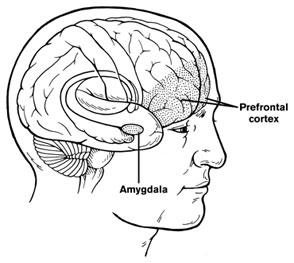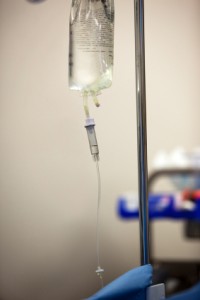Alcohol Use Disorders That Begin Before Age 21 May Cause Lasting Changes to Amygdala
 In a 2019 article in the journal Translational Psychiatry, researcher John Peyton Bohnsack and colleagues report that people with alcohol use disorders that began before they were 21 years of age show amygdala changes that people with alcohol use disorders that began after the age of 21 do not appear to have.
In a 2019 article in the journal Translational Psychiatry, researcher John Peyton Bohnsack and colleagues report that people with alcohol use disorders that began before they were 21 years of age show amygdala changes that people with alcohol use disorders that began after the age of 21 do not appear to have.
The amygdalas of those who began abusing alcohol in adolescence showed greater expression of the long non-coding RNA known as BDNF-AS. The increased BDNF-AS was associated with decreased levels of brain-derived neurotrophic factor (BDNF) in the amygdala. BDNF protects neurons and is important for learning and memory.
According to Bohnsack and colleagues, “Adolescence is a critical period in brain development and adolescent drinking decreases orbitofrontal cortex activity and increases amygdala activity leading to less executive control, more emotional impulsivity, alterations in decision-making, and [a higher risk of engaging] in risky behaviors and develop[ing] mental health problems later in life.”
NAC Reduces Alcohol Cravings, If Not Use
The antioxidant N-acetylcysteine (NAC) has been found to reduce many types of habitual behavior, from gambling to drug use to compulsive hair-pulling. A recent study by researcher Gihyun Yoon and colleagues, which was presented at a 2015 scientific meeting, found that while NAC and placebo reduced days of heavy drinking by about the same rates, NAC significantly reduced alcohol cravings and quality of life compared to placebo among participants with alcohol dependence.
In the 8-week study, 44 participants aged 18–65 received either 3600mg/day of NAC or a placebo. This dose of NAC was higher than the 600mg–2400mg doses that have typically been used in research settings, and there were few side effects, confirming that NAC is a safe treatment.
The authors are not sure how NAC produces this effect, but it may be by regulating the neurotransmitter glutamate.
Family History Of Alcoholism Predicts Positive Response To Ketamine
 The drug ketamine can bring about antidepressant effects rapidly when given intravenously, but these effects last only a few days. In a recent study, bipolar depressed patients with alcoholism or a family history of alcoholism in first-degree relatives had a more extended positive antidepressant response to IV ketamine than those without this history, and fewer adverse effects from the treatment. The study, published by David Luckenbaugh et al. from the National Institute of Mental Health in the journal Bipolar Disorders in December 2012, replicates similar findings in patients with unipolar depression, where positive family history of alcoholism also predicted better response and fewer adverse effects from IV ketamine.
The drug ketamine can bring about antidepressant effects rapidly when given intravenously, but these effects last only a few days. In a recent study, bipolar depressed patients with alcoholism or a family history of alcoholism in first-degree relatives had a more extended positive antidepressant response to IV ketamine than those without this history, and fewer adverse effects from the treatment. The study, published by David Luckenbaugh et al. from the National Institute of Mental Health in the journal Bipolar Disorders in December 2012, replicates similar findings in patients with unipolar depression, where positive family history of alcoholism also predicted better response and fewer adverse effects from IV ketamine.
Alcohol and ketamine have a common mechanism of action. They are both antagonists of the glutamate NMDA receptor, meaning they limit the effects of glutamate, the major excitatory neurotransmitter in the brain. This suggests a theoretical explanation for why a history of alcoholism might relate to ketamine response.
Editor’s Note: Family history appears to be linked to how patients respond to different mood stabilizers. Lithium works best in those patients with a positive family history of mood disorders (especially bipolar disorder). Carbamazepine works best in those without a family history of bipolar disorder among first-degree relatives. Lamotrigine works best in those with a positive family history of anxiety disorders or alcoholism.
Drugs that are effective in patients with a family history of alcoholism all target glutamate in the brain. Lamotrigine decreases glutamate release, while ketamine reduces glutamate’s effects at the receptor. Both decrease glutamate function or activity. Like lamotrigine, carbamazepine also decreases glutamate release and has good effects in those with a history of alcoholism.
Memantine is another mood-stabilizing drug that is an antagonist of the NMDA receptor, like ketamine and alcohol. It will be interesting to see whether memantine will also be successful in those with a personal or family history of alcoholism.


